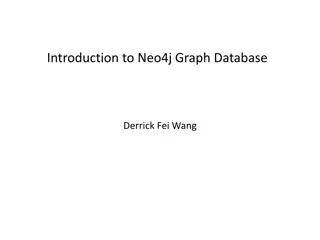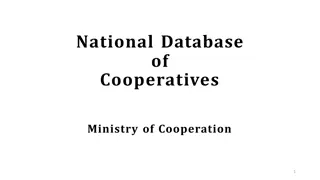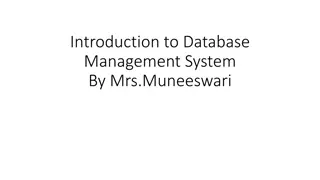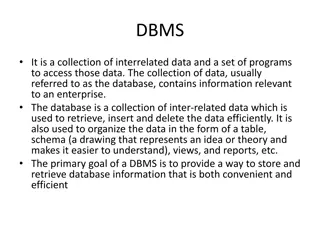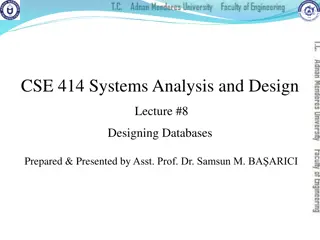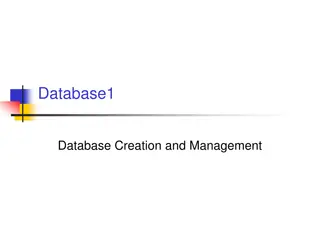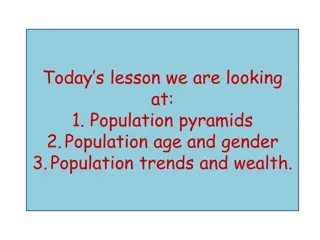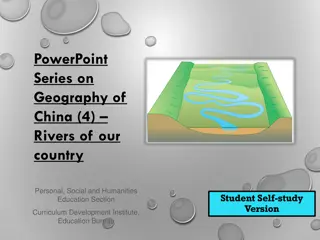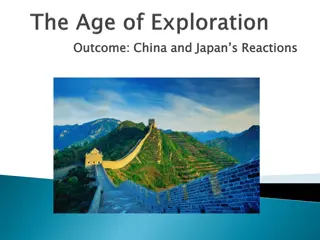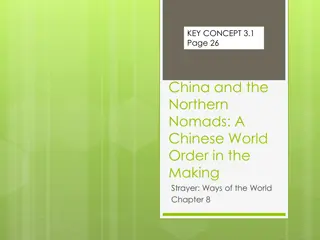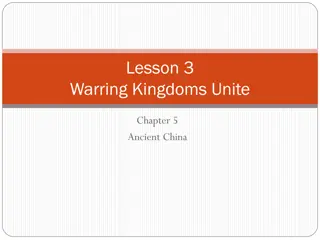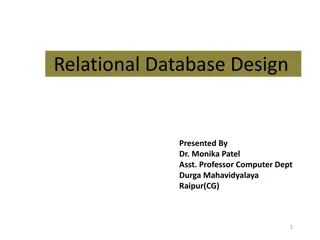Understanding China's Economic Growth and Trade Policy Shifts
Explore the impact of China's growth trajectory, the China Shock phenomenon, and its entry into the WTO in 2001. Discover how economic policies and trade reforms contributed to China's export growth and overall economic development.
1 views • 50 slides
Looking for after MBBS in China: A Coordinate for Attempting Masters
For many aspiring doctors, the journey towards a career in medicine begins with the crucial choice of choosing the correct institution for their instruction. In subsequent years, China has created a prominent goal for students looking for quality medical education at an affordable price. With its wo
4 views • 4 slides
Understanding Neo4j Graph Database Fundamentals
This comprehensive presentation delves into the fundamentals of Neo4j graph database, covering topics such as the definition of graph databases, reasons for their usage, insights into Neo4j and Cypher, practical applications like data flow analysis, and hands-on instructions on creating and querying
0 views • 20 slides
National Database of Cooperatives: Ministry of Cooperation Initiatives
The Ministry of Cooperation is developing a National Database of Cooperatives to enhance transparency, governance, and policymaking in the cooperative sector. The database aims to provide comprehensive information on cooperatives across sectors, improve coordination among stakeholders, and facilitat
0 views • 22 slides
Database Design Principles and Management Overview
This document presents an overview of database design principles, including structured, semi-structured, and unstructured data types. It delves into the role of Database Management Systems (DBMS) in defining, constructing, manipulating, and sharing databases effectively. It also covers various types
0 views • 47 slides
Introduction to Database Management System Explained
This presentation covers the basics of database management systems, including definitions of data, types of data, structured and unstructured data, storing data in computers using file systems and database systems, and issues with file systems like data redundancy, inconsistency, difficult data acce
1 views • 18 slides
Understanding Database Normalization and Functional Dependencies
Database normalization is a crucial process that aims to improve database design by organizing data into higher forms of normality. This helps in reducing redundancy and ensuring data integrity. Functional dependencies play a key role in defining relationships between attributes in a database. By un
0 views • 33 slides
Oracle 19c Standard Edition: RAC Migration and Database Solutions Overview
Explore the implications of Oracle Database 19c Standard Edition no longer supporting RAC, and learn about disaster recovery and high availability options for users. Delve into the differences between HA and DR, along with the significance of workload isolation and scalability in database management
3 views • 22 slides
Understanding Database Management Systems (DBMS)
A Database Management System (DBMS) is a crucial tool for organizing, storing, and managing data efficiently. It allows users to create, update, retrieve, and delete data effectively, ensuring data consistency and security. DBMS software like MySQL and Oracle provide interfaces for various database
0 views • 21 slides
Costs and Risks of Implementing a Database Approach
Implementing a database approach involves additional costs and risks that need to be managed effectively. From hiring specialized personnel to dealing with conversion costs and organizational conflicts, organizations must carefully consider the implications of transitioning to a database system. The
0 views • 10 slides
Database Design Process and Concepts
This lecture on designing databases covers the database design process, normalization, transforming E-R diagrams, physical database design concepts, and steps in logical database modeling. It highlights the importance of logical and physical database design in system development, providing insights
0 views • 64 slides
Understanding Entity-Relationship Diagrams (ERD) for Database Design
Entity-Relationship Diagrams (ERD) are vital in database design, illustrating entities and their relationships. They help in conceptualizing data models and laying the groundwork for database structures. The process involves identifying entities, defining relationships, and analyzing interactions to
0 views • 40 slides
Performers and Programs Database Webinar - Overview and Features
Learn about the Performers and Programs Database Webinar happening on October 22, 2021. This webinar, presented by Peter Kowalski and introduced by Sharon B. Phillips, offers valuable information about the database's features, including how performers advertise programs, categorization, virtual prog
0 views • 25 slides
Overview of Database Systems Architecture and Languages
A database system is essential for storing and managing an organization's data. The architecture includes components like file manager, database manager, and query processor. Additionally, DML and DDL compilers play crucial roles in handling data manipulation and definition tasks. Various data struc
2 views • 28 slides
Understanding Database Management Systems and Concepts
Explore the world of databases with topics ranging from Database Creation and Management to Basic Database Terms. Learn about the significance of data, information, and metadata in decision-making processes. Discover the purpose of database systems and the role of Database Management Systems (DBMS)
0 views • 25 slides
The World of Azure Database Offerings
Exploring Azure's database offerings including Azure Cosmos DB and Azure SQL Database. Azure Cosmos DB provides a globally scalable document database solution, while Azure SQL Database is a great option for SQL Server workloads. Both platforms offer unique features such as low latency, scalability,
0 views • 15 slides
Understanding Population Pyramids and Demographic Trends in China
Explore the population pyramids, demographic trends, and economic development stages in China. Discover key features such as gender distribution, age bands, and dependency ratios. Learn about China's historical population data, urbanization rate, and median age. Gain insights into how China's popula
0 views • 22 slides
Understanding China's Basic Unit Register
China's Basic Unit Register is a database containing essential information of legal entities and industrial activity units engaged in economic and social activities in China. It plays a crucial role in economic statistics, providing data on economic activities, social impact, and statistical integra
0 views • 14 slides
Distribution Pattern of River Zones in China
China has a vast network of rivers with different characteristics and distribution patterns. The country is divided into five zones based on factors like precipitation and runoff levels, ranging from abundant to deficit zones. These zones play a crucial role in understanding the water resources and
0 views • 14 slides
The Opium War and Its Impact on China: Political, Economic, and Social Perspectives
The Opium War was a significant historical event that led to the signing of the Treaty of Nanjing in 1842 between China and Great Britain. This treaty marked the beginning of unequal treaties and extraterritoriality in China. The war stemmed from the British East India Company's opium trade, which l
0 views • 12 slides
Impacts of Marketisation on Home Care for Older People in Urban China
This study by Wenjing Zhang from the University of Bristol delves into the effects of the marketisation process on home care for the elderly in urban China. It explores the rationale behind the marketisation of care, the trends in home care marketisation, and the processes involved. The background s
0 views • 19 slides
China and Japan's Historical Reactions to European Influence in East Asia
East Asia, particularly China and Japan, faced challenges due to European luxury trade demands. Ming China resisted European threats to its peace and prosperity, while Zheng He's voyages opened new exploratory opportunities. Ming's isolationist trade policies contrasted with Qing Dynasty's expansion
0 views • 12 slides
China-Africa Supply Chain Cooperation: Challenges and Opportunities
China-Africa Supply Chain Cooperation presents both challenges and opportunities for development. The growth of China-Africa supply chain is crucial, considering Africa's participation in the global supply chain mainly focused on providing primary products. The strategic importance of this relations
0 views • 19 slides
HBCU China Partnership Scholarships Summer 2016 Programs
Explore a unique opportunity to study in China with the HBCU China Partnership Scholarships Summer 2016 programs. Take three classes in six weeks in disciplines such as Biology, Business, Chemistry, Computer Engineering, Environmental Science, and Journalism. Housing and tuition are covered, with on
0 views • 9 slides
Decoding China's Belt and Road Initiative in South Asia
Delve into the impacts and implications of China's Belt and Road Initiative (BRI) and China-Pakistan Economic Corridor (CPEC) in South Asia, analyzing the economic, geopolitical, and strategic aspects. Explore the costs, benefits, alliances, and losses experienced by Pakistan amidst its engagement w
0 views • 12 slides
Understanding China's Belt and Road Initiative Impacts on Global Value Chains
China's Belt and Road Initiative, proposed by Xi Jinping in 2013, has significant implications for Global Value Chains (GVCs). China's role as a major infrastructure funder through CDB/EXIM/AIIB raises issues such as risk, debt sustainability, weak GVC linkages, and environmental safeguards. Despite
0 views • 21 slides
China and the Northern Nomads: Interactions and the Tribute System
Two enduring misconceptions in Chinese history are challenged as the interactions between China and the northern nomads are explored. For centuries, China's engagement with the nomadic peoples of the steppes influenced its development. The Tribute System was established to manage relations with non-
0 views • 10 slides
Jewish Presence in China: A Unique Chapter in Jewish History
Jewish history extends beyond Europe to Asia, including China where evidence of Jewish presence dates back to the 9th century. Despite facing challenges such as assimilation, the Kaifeng Jews in Northeast China rose to high status in business and government. The decline of this community, now with o
0 views • 32 slides
Ancient China: History and Dynasties Review
Explore the fascinating history of Ancient China, covering topics such as landforms, dynasties, cultural practices, and significant landmarks like the Great Wall of China. Learn about the oracle bones, Confucian teachings, the Silk Road, and the Qin Dynasty's standardization efforts. Dive into the r
0 views • 10 slides
Ancient China: Rise of the Qin Dynasty under Shi Huangdi's Rule
Explore the history of Ancient China as Shi Huangdi conquers warring kingdoms to unify the land. Discover how he became China's First Emperor, strengthened the empire, organized the government, and built the Great Wall for protection. Learn about the legacy and impact of the Qin Dynasty in shaping C
0 views • 25 slides
The Collapse of Imperial China and the Rise of Nationalism
In early 20th-century China, resentment towards foreign control led to the overthrow of the Qing Dynasty by the Nationalists, with leaders like Sun Yixian and the Kuomintang Party. Despite efforts for political and economic rights, internal conflicts and external influences such as World War I impac
0 views • 17 slides
China Biographical Database Project (CBDB) Workshop Highlights
Explore the insights shared at the Tang Studies Society workshop on the China Biographical Database Project at Harvard University in 2013. Learn about the structure, functions, and entities tracked in CBDB, and delve into the tables representing key data categories. Get ready to leverage this valuab
0 views • 40 slides
Why Japan and China Have a Frosty Relationship Explained
Japan and China have an uneasy relationship, primarily due to disputes over uninhabited islands in the East China Sea known as the Senkaku Islands in Japan and the Diaoyu Islands in China. Tensions have escalated over potential undersea oil reserves, shipping lanes, and fishing areas near the island
0 views • 39 slides
Tensions Rise as US, China Clash Over Disputed Islands
The United States and China clashed over territorial claims concerning a group of islands in the East China Sea last week. The dispute over the Senkaku-Diaoyu islands is fueled by their strategic location near vital shipping lanes and potential oil reserves. Japan and China present historical argume
0 views • 14 slides
The Politics of China: House & Senate Competition Bills
The politics surrounding China have become a focal point for both Democrats and Republicans in the U.S., particularly in relation to trade policy. The House and Senate have been engaged in a competition of bills regarding China's economic practices and their impact on U.S. workers and businesses. Th
0 views • 11 slides
Understanding Relational Database Design Fundamentals
This content delves into the crucial aspects of relational database design, including normalization, pitfalls, RDBMS design issues, and the overall database design process. It emphasizes the need for well-structured relation schemas to minimize redundancy, ensure data integrity, and facilitate effic
1 views • 53 slides
China SWIM Program Overview: Enhancing Air Traffic Management
The China SWIM program, initiated in 2011, is a sub-program under the China Civil Aviation Collaborative ATM Technology Program. Funded by the Ministry of Science and Technology (MOST) and the Civil Aviation Administration of China (CAAC), the project aims to study and evaluate SWIM concepts and key
0 views • 10 slides
New Strategic Framework for US-China Policy
The article discusses the need for a flexible framework to achieve strategic objectives in US-China policy. It emphasizes the importance of understanding Chinese political and economic realities to benefit US interests, highlighting the risks of China aligning more with Russia. Advocating for nurtur
0 views • 18 slides
Understanding Database Normalization and BCNF in Database Systems
Learn about the process of database development, including E-R diagrams, converting to relations, developing database operations, normalization, and BCNF. Explore algorithms for achieving BCNF and example scenarios to understand key concepts in database systems.
0 views • 43 slides
Understanding RoHS and China RoHS Compliance Regulations
RoHS and China RoHS are regulations that restrict the use of hazardous substances in electronic products to reduce environmental impact. RoHS targets substances like lead and mercury, while China RoHS is specific to pollution control in electronic products sold in China. Compliance with these regula
0 views • 18 slides


